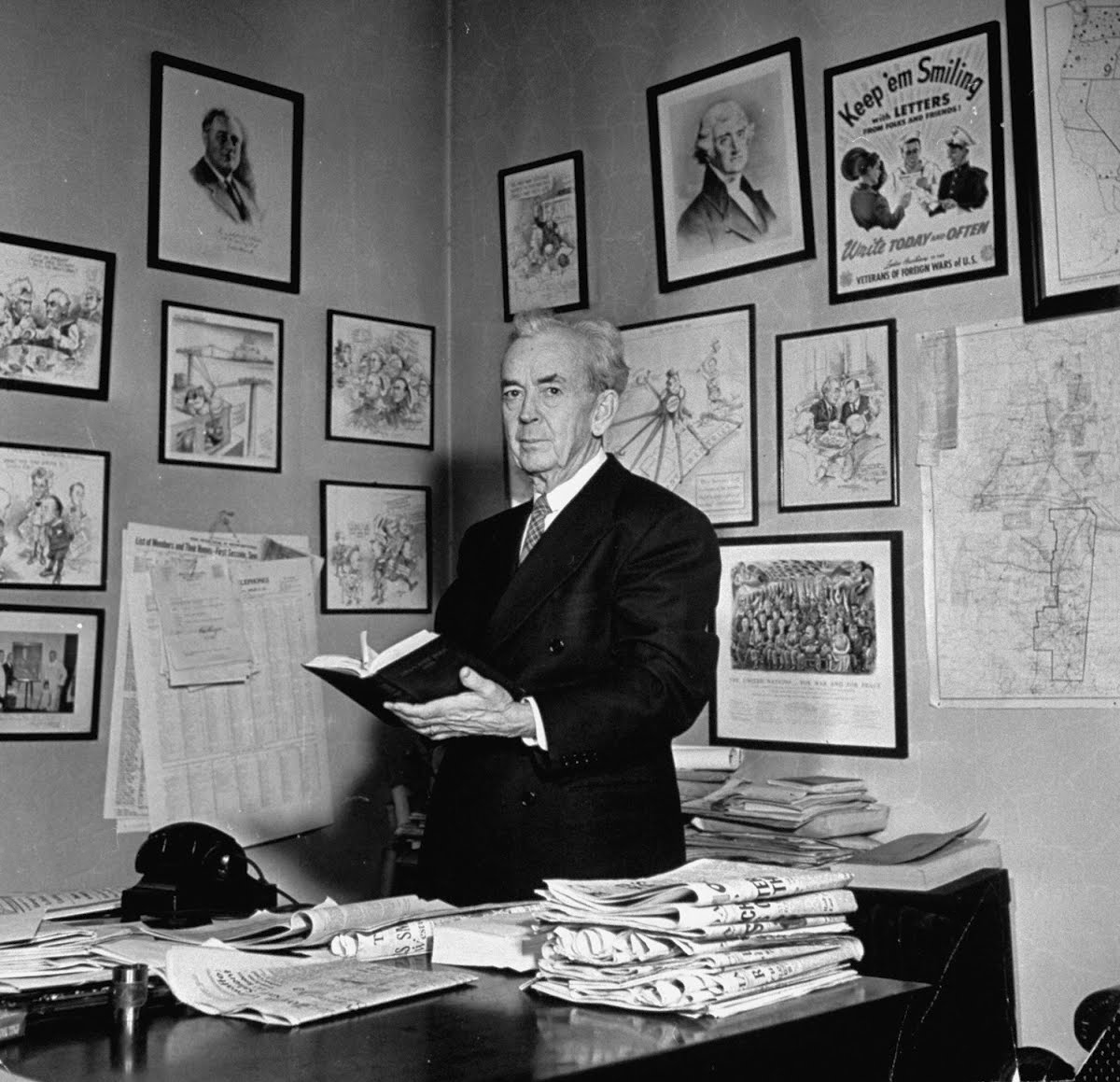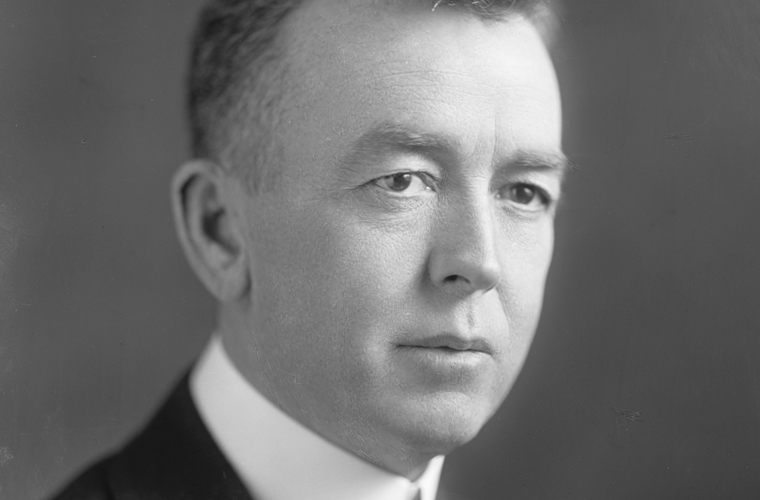John Rankin was born in Itawamba County, Mississippi, on 29th March 1882. After graduating from the University of Mississippi in 1910 he was admitted to the bar and worked as a lawyer in Clay County. In 1911 he was appointed prosecuting attorney of Lee County but joined the USA Army during the First World War.
A member of the Democratic Party, Rankin was elected to the House of Representatives in 1921. Chairman of the Committee on World War Veterans’ Legislation he was co-sponsor of the bill that created the Tennessee Valley Authority. Rankin was a strong supporter of President Franklin D. Roosevelt and his New Deal policies. However, he was a strong opponent of civil rights and his involvement with the Ku Klux Klan exposed him as a racist. According to Neal Gabler, “Rankin, a thin white-haired orator of the old southern stentorian school… was an open racist, nativist, and anti-Semite.” A fellow member, Emanuel Celler, later commented: “Rankin came to the House the same year I did. The prejudices with which he later became identified he brought with him. He became bolder as the years went by and to his theme of white supremacy he added that of anti-Semitism. To listen to his harangues on the floor became, for me, an agony.”
In 1938 the House of Un-American Activities Committee (HUAC) was established. Rankin was appointed as a member of the HUAC. It originally investigated both left-wing and right-wing political groups. Some called for the leaders of the Ku Klux Klan to be interrogated by the HUAC. Martin Dies, the chairman of the HUAC, however, was a supporter of the Klan and had spoken at several of its rallies. Other members of the HUAC such as Rankin and John S. Wood were also Klan sympathizers. Wood defended the Klan by arguing that: “The threats and intimidations of the Klan are an old American custom, like illegal whisky-making.” Eventually, Ernest Adamson, the HUAC’s chief counsel, announced that: “The committee has decided that it lacks sufficient data on which to base a probe.” Rankin added: “After all, the KKK is an old American institution.” Instead, the HUAC concentrated on investigating the possibility that the American Communist Party had infiltrated New Deal projects.

According to Jack Anderson, the journalist, Drew Pearson, attacked Rankin and the HUAC: “Pearson’s intended argument was that the HUAC probe was unconstitutional in the first place. He offered evidence that Representative Rankin had used the committee rostrum, without rebuke, to praise the Ku Klux Klan as representative of the highest Americanism and that the committee had steadfastly refused to probe the Klan. This disqualified it. Drew deduced, from any objective inquiry into un-Americanism, and invalidated its proceedings. The court did not acknowledge Drew’s jurisprudential authority, however, and would not permit him to take the stand, though it did admit to the record some of his documentation on Rankin. But the attempt to testify was widely publicized.”
During the Second World War Rankin alleged that the loss of one battle was due to the cowardice of black soldiers. In February 1944 he successfully opposed measures to give black soldiers the vote. This was a measure proposed by the journalist, Walter Winchell. In the House of Representatives, Rankin described Winchell as a “little kike”. Winchell replied: “Consider the time it is. we are at war with Nazi Germany, whose present rulers came to power on a program of racial persecution and murders. Now in the American Congress, these Hitler prejudices get applause and laughter.”
On 17th July 1944, munitions detonated while being loaded onto a cargo vessel at Port Chicago, California, killing 320 sailors and civilians and injuring 390 others. It was suggested that Congress should give $5,000 to the victim’s families. However, Rankin insisted the amount be reduced to $2,000 when he learned most of the dead were black sailors. Eventually, it was agreed to give them $3,000. When African American Adam Clayton Powell Jr. was elected to Congress in 1945, Rankin vowed to never sit next to him.
On 20th October 1947, the House of Un-American Activities Committee (HUAC) opened its hearings concerning communist infiltration of the motion picture industry. John Rankin declared he had information that “one of the most dangerous plots ever instigated for the overthrow of this government has its headquarters in Hollywood… The information we get is that this is the greatest hotbed of subversive activities in the United States. We’re on the trail of the tarantula now, and we’re going to follow through. The best people in California are helping us.”
When the screenwriter, Albert Maltz, appeared he raised the issue that Rankin and J. Parnell Thomas had a record of opposing measures to bring an end to lynching and in the past had been a supporter of the Ku Klux Klan. Maltz added: “I will take my philosophy from Thomas Paine, Thomas Jefferson, Abraham Lincoln, and I will not be dictated to or intimidated by men to whom the Ku Klux Klan, as a matter of Committee record, is an acceptable American institution.”
Rankin also came under attack from another witness, Samuel Ornitz, who raised the issue that the majority of those brought before the HUAC, were Jewish: “I wish to address this Committee as a Jew because one of its leading members is the outstanding anti-Semite in the Congress and revels in this fact. I refer to John E. Rankin. I refer to this evil because it has been responsible for the systematic and ruthless slaughter of six million of my people. Nor were they alone to die. Thirty million others died, including American boys. It may be redundant to repeat that anti-Semitism and anti-Communism were the number one poison weapon used by Hitler – but still terribly relevant, lest we forget. In speaking as a Jew, I speak in a deeper sense as an American, as the one who has to take the first blow for my fellow Americans. For when Constitutional guarantees are overridden, the Jew is the first one to suffer… but only the first one. As soon as the Jew is crushed, the others get it. Or haven’t we been through this… the most horrible of wars to date!”
Walter Goodman, the author of The Committee (1964) argued: “The source of Rankin’s animus against Hollywood – and he made no particular effort to conceal it – with the large number of Jews eminent in the film industry. In Rankin’s mind, to call a Jew a Communist was a tautology. His convictions led him to attribute all the horrors of the Russian revolution to Trotsky and see Stalin as a kind of reformer.” In the halls of Congress he called Walter Winchell “a little slime-mongering kike” and he took glee in baiting his Jewish colleagues, particularly Adolph Sabbath and Emanuel Celler. One day he referred to the latter as “the Jewish gentleman from New York”. When Celler protested, Rankin asked, “Does the member from New York object to being called a Jew or does he object to being called a gentleman? What is he kicking about?”
In a debate about the 1949 Peekskill Riots Rankin blamed Paul Robeson for inciting the trouble. Jacob Javits disagreed and instead condemned the white mob for violating constitutional guarantees of freedom of speech and free assembly. Angered by these comments, Rankin shouted out, “It was not surprising to hear the gentlemen from New York defend the Communist enclave” and added that it was well-known that Javits was in sympathy “with that Nigger Communist and that bunch of Reds who went up there.”
Vito Marcantonio protested to House Speaker Sam Rayburn that “the gentlemen from Mississippi used the word ‘******.’ I ask that the word be taken down and stricken from the record inasmuch as there are two members in this house of Negro race.” Rayburn claimed that Rankin had not said “******” but “Negro” but Rankin yelled out “I said Niggra! Just as I have said since I have been able to talk and shall continue to say.” Rayburn defended Rankin, ruling that “the gentlemen from Mississippi is not subject to a point of order… referred to the Negro race and they should not be afraid of that designation.”
Rankin was defeated for re-election to the House of Representatives in 1952 by Thomas G. Abernethy. He retired from politics and afterward worked in the real estate business.
John E. Rankin died in Tupelo, Mississippi, on 26th November 1960.

